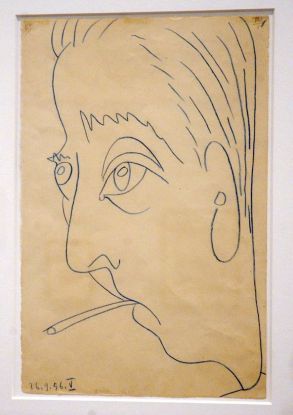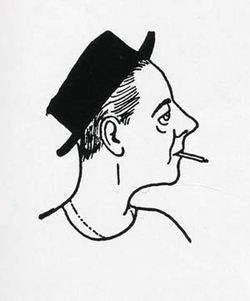
JACQUES PRÉVERT – 1900 : 1977
For a poet – for any kind of writer – English is a seductive language. With a vocabulary that is rich in synonyms way beyond reasonable need, wrapped up in a mind-boggling and jaw-busting complexity of conjugational structure, it seems almost mean-spirited to resist its blandishments. Small wonder that Dylan Thomas’s capacity for intoxication above and beyond the call of duty afflicted his creative output every bit as much as his social life. Interesting too, at the other end of the linguistic spectrum, that Samuel Beckett exerted so much energy in paring the English language back to the bone in a search for a barer, leaner form. And small wonder, maybe, that, in the final analysis, his language of preference for writing was French.
Since schooldays I have been intrigued by the stark simplicity of the poetry of Jacques Prévert and attempting to translate pieces into English remains a fascinating exercise. My enormously enlightened French teacher Roger Gerhardt regularly set us translation assignments using the poems and lyrics of the likes of Prévert, Paul Fort, Anne Sylvestre and Georges Brassens. And many years on I posted several Prévert translations, along with other treatments of contemporary French poems, to my first blog, Dick Jones’ Patteran Pages. What strikes me each time I translate is the need to resist the temptation to substitute for some dry, laconic statement the kind of imagistic phrasing that a poet writing in English might feel impelled to use. All too often the direct, the pithy, the economic are anathema to the writer steeped in the cultural traditions of allusion, euphemism, equivocation and circumlocution.
If I have begun to respond to the need for absolute fidelity to the skeletal properties of Prévert’s verse, realisation has come from an unusual source – the blues. Much of his poetry has been set to music, particularly in the boulevardier genre. And there has long been a link between aspects of French chanson and the blues – albeit one more of spirit and atmosphere than of direct style. There is something in the specificity of focus, the repetition of a repeated theme and the interposition of surreal or dreamlike imagery that creates an association between a poem like Déjeuner du Matin and a ruefully reflective blues like T-Bone Walker’s Mean Old World.
Beyond this point all is mere speculation. If there’s a PhD to be had in the pairing of the French verse of terse personal narrative and the blues, generously I’ll leave the option open to another to chase it up. In the meantime, here’s my rendition of Jacques Prévert’s Déjeuner du Matin, followed by a set of shorter poems, and culminating in the chilling Despair Sits On A Bench.
MORNING MEAL
He poured the coffee
Into the cup
He poured the milk
Into the cup of coffee
He put sugar
In the café au lait
With the teaspoon
He stirred it
He drank the café au lait
And he replaced the cup
Without speaking to me
He lit a cigarette
He blew smoke rings
He placed the ash
In the ashtray
Without speaking to me
Without looking at me
He got up
He placed his hat
On his head
He put on
His mackintosh
Because it was raining
And he went
Into the rain
Without a word
Without looking at me
And me I placed
My head in my hands
And I cried.
…
ALICANTE
An orange on the table
Your dress upon the carpet
And you in my bed
Sweet present of the present
Freshness of the night
Warmth of my life.
…
THE STREAM
Much water has passed beneath the bridge
and much blood too
But upon feet of love
there flows a great white stream
And in the gardens of the moon
where every day is my festival
this stream sings in its sleep
and this moon is my head
within which there turns a great blue sun
and the sun is your eyes.
…
THE FIRST DAY
White sheets in a cupboard
Red sheets on a bed
A child within the mother
The mother in her pain
The father in the corridor
The corridor in the house
The house in the town
The town within the night
The death within the cry.
…
PARIS BY NIGHT
Three matches, struck one by one in the night.
The first to see your face entire.
The second to see your eyes.
The last to see your mouth,
and then the darkness all around to remember
as I hold you in my arms.
…
SHIFTING SANDS
Demons and marvels
Winds and tides
In the distance the sea has already vanished
Demons and marvels
Winds and tides
And you
Like seagrass touched gently by the wind
In your bed of sand you shift in dreams
Demons and marvels
Winds and tides
In the distance the sea has already vanished
But in your half-closed eyes
Two little waves remain
Demons and marvels
Winds and tides
Two little waves in which to drown.
Note: This poem was set to music by film composer Joseph Kosma (‘Les Regles Du Jeu’,
‘Les Grands Illusions’, ‘Les Enfants Du Paradis’), for the film ‘Les Visiteurs Du Soir’.
Kosma also knew Brecht, worked with his musical collaborator Hans Eisler and supplied music to Prevert’s ‘Les Feuilles Mortes’.
DESPAIR SITS ON A BENCH
In a square on a bench
sits a man who calls out as you pass
He wears pince-nez an old grey suit
He smokes a little cheroot he is seated
and he calls out as you pass
Or he simply beckons
Best not to look
Best not to listen
Best to pass by
Make as if you haven’t seen him
As if you haven’t heard him
Best to pass by pick up your feet
If you glance at him
If you listen
He beckons and nothing and no one
Can stop you from seating yourself beside him
Then he looks at you and smiles
And your terrible suffering begins
And the man continues to smile
And you smile the same smile
Exactly
And the more you smile the more you suffer
Terribly
The more you suffer the more you smile
Fixedly
And you stay there
Frozen still
Smiling on the bench
Children play right next to you
Passers-by pass by
Unhurried
Birds fly up
Leaving one tree
For another
And you stay there
On the bench
And you know you know
That you will never play
Like the children
You know that you will never pass by
Unhurried
Like the passers-by
That you will never fly up
Leaving one tree for another
Like the birds.


Enjoyed reading those. I’ve just dug out my Penguin Modern European Poets Pervert. Ferlinghetti translated it* – and wrote the introduction, which I think I’ll read now. It’s useful for French poets that rain and cry sound similar – and frustrating for English translators.
*btw, I’ve just read Ferlinghetti’s Morning Meal. I preferred yours. “Poured” over “put”, for a start.
That should read “Prévert” of course. The source of that particular schoolboy joke (which annoys me as I respect the guy) in this case is the predictive text!
Read it (the intro). Full of great quotes. “Man is destined for joy but there’s a permanent conspiracy against it”.
And there was I thinking it was Ferlinghetti in a momentary lapse back into street humour!
Pingback: POEMS BY JACQUES PRÉVERT — sisyphus – Naked Cities Journal